
EVOCARE BILLINGS & IT SOLUTIONS
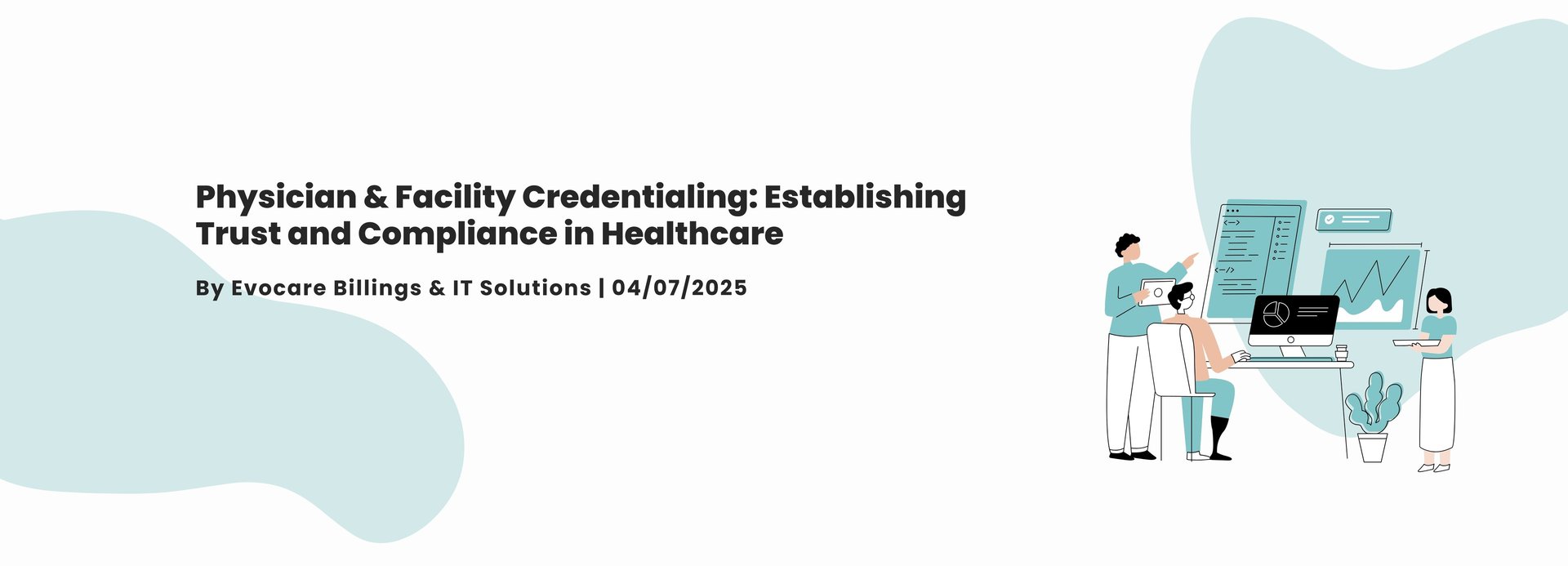
Physician & Facility Credentialing: Establishing Trust and Compliance in Healthcare
By Evocare Billings & IT Solutions
Understanding the Importance of Credentialing
Credentialing isn’t just a regulatory formality—it is essential for:
Call Us Now | +1 (323) 412-5399
Get a Quote
We Are Looking Forward to Hear from You..!!
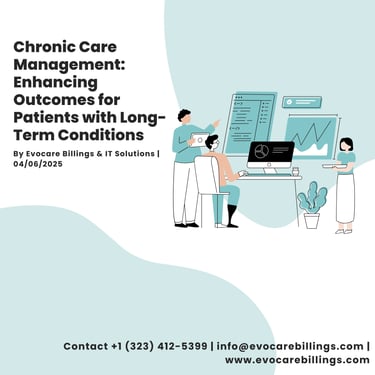

Key Components of the Credentialing Process
Verification of provider information: Includes NPI, state licenses, DEA registration, board certifications, education, and work history.
Background checks: Criminal history, malpractice claims, and any disciplinary actions are reviewed.
CAQH profile management: Most payers require an up-to-date CAQH profile for enrollment.
Payer enrollment: Providers must be added to insurance panels to begin billing.
Hospital privileging documentation: Required if the provider plans to see patients in inpatient settings.
Common Types of Credentialing
Stay Organized: Maintain a central repository for all documents and renewal reminders.
Keep CAQH Updated: Ensure all fields are complete and documents are current.
Respond Promptly: Quickly address follow-up requests from payers.
Use Technology: Credentialing software can help manage timelines and alerts.
Conduct Internal Audits: Periodically review provider files and credentials to prevent lapses.
Challenges in Credentialing
Submit and attest to information every 120 days
Upload necessary documentation (licenses, certifications, liability insurance, etc.)
Authorize specific insurance plans to access your profile
Outsourcing Credentialing Services
Avoid administrative overload
Reduce the risk of errors and rejections
Speed up the payer enrollment process
Ensure compliance with evolving guidelines
Credentialing for Facilities vs. Individual Providers
Facility licenses, accreditations, and liability coverage
Ownership structures and leadership background checks
Staff credentialing and privileging systems
OSHA, HIPAA, and CLIA compliance documentation
While the core principles of credentialing apply to both facilities and individual providers, facilities undergo a more extensive review:
Final Thoughts
Credentialing is a foundational step in building a compliant, reputable, and financially viable healthcare practice. Whether you're launching a new facility or onboarding a new physician, timely and accurate credentialing is essential. Investing in credentialing—either internally or through outsourcing—ensures providers can deliver care without administrative interruptions or reimbursement issues.
Pro Tip: Start the credentialing process as early as possible (at least 90 days prior to the planned start date) to avoid costly delays in seeing patients or billing payers.
Physician & Facility Credentialing: Establishing Trust and Compliance in Healthcare
Healthcare providers, whether individual physicians or entire facilities, must establish credibility and meet regulatory standards to offer services to patients and receive reimbursement from insurance payers. Credentialing is the formal process through which providers' qualifications, licenses, training, and professional history are verified before they can be enrolled with insurance panels. Without proper credentialing, facilities risk claim denials, payment delays, or legal consequences. It is a crucial step in the healthcare revenue cycle management process that directly impacts patient care, practice reputation, and financial stability.
JOIN OUR MEDICAL BILLING NEWSLETTER
Keep your practice ahead with the latest trends, expert tips, and industry updates in medical billing. Evocare Billing provides healthcare practitioners, physician groups, and hospitals with seamless billing solutions to optimize revenue and minimize claim denials. Subscribe to our newsletter and gain exclusive insights to enhance your practice’s financial success.
CONNECT WITH US ON SOCIAL MEDIA...!!
Stay informed and engaged with the latest updates in medical billing. Follow Evocare Billing on social media for expert insights, industry trends, and tips to maximize your revenue. Join our community and take your practice to the next level!
Payment Posting
RCM SERVICES
Account Receivable
Denial Management & Appeals
Physician & Facility Credentialing
Prior Authorizations
Medical Records & Fax Handling
Virtual Medical Assistant
Chronic Care Management
Insurance Verification and Eligibility
End to End RCM Services
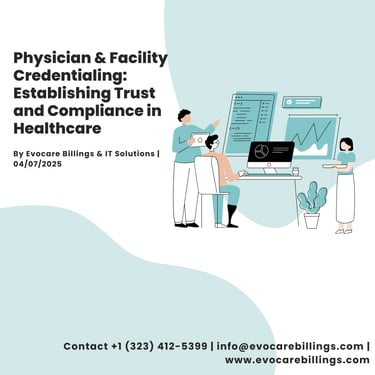

Credentialing reassures patients, insurance payers, and facilities that the provider meets the highest standards of care and ethics.
These hurdles can delay provider start dates and revenue cycles, leading to financial strain and patient dissatisfaction.
The Council for Affordable Quality Healthcare (CAQH) serves as a central platform for storing and sharing credentialing information. Most payers require providers to maintain an updated CAQH profile:
Many practices choose to outsource credentialing to specialized firms to:
Credentialing typically involves:
The process may take 60 to 120 days, depending on the payer and completeness of the documentation. Delays can occur due to missing or inconsistent data, which makes maintaining accurate and complete records critical.
Initial Credentialing: For new providers or facilities joining a practice or network.
Recredentialing: Typically required every 2-3 years to maintain status with payers.
Hospital Privileging: Grants providers the right to treat patients at specific hospitals.
Delegated Credentialing: Larger groups or organizations may receive authority from payers to credential their own providers internally.
Incomplete or inconsistent documentation
Delays from insurance payers
Constantly changing payer requirements
Lack of internal process tracking
Communication gaps with credentialing departments or third-party administrators
Keeping this profile up to date significantly reduces delays during payer enrollment.
Outsourced credentialing teams typically:
Facilities must also pass site inspections and meet payer-specific criteria to gain approval for participation.
Ensuring patient safety and care quality
Validating professional competency and certifications
Enabling reimbursement from Medicare, Medicaid, and commercial payers
Maintaining compliance with legal and accreditation requirements (e.g., NCQA, JCAHO)
Supporting referral networks and hospital affiliations
How to Streamline the Credentialing Process
The Role of CAQH in Credentialing
Stay current with payer-specific rules
Manage CAQH profiles and document submissions
Communicate with insurance representatives
Track recredentialing and license renewal deadlines
This partnership allows healthcare providers to focus more on patient care while reducing administrative burdens.
Blogs | Subscribe To Billing Insights
Enjoy Seamless Solutions, Excellent Results..!!
Earn more and get paid faster with Evocare Medical Billing's 24/7 services.
Evocare is a medical billing provider that integrates with your existing EHR system for streamlined processing.
We are honored to offer top-tier service with a 99% retention rate that sets us apart.
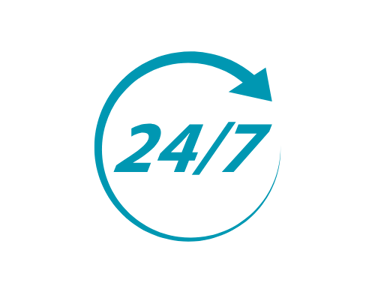
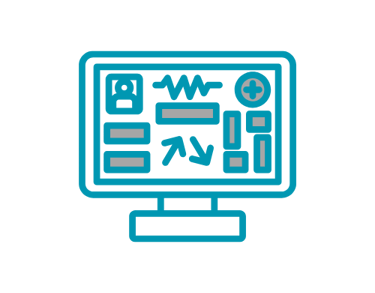

About Us:
We are dedicated to providing solutions that streamline operations & maximize revenue for providers. With a commitment to accuracy, efficiency & compliance, we help practice focus on delivering exceptional patient care.
Services:
Resources:
Terms & Conditions
|
|
HIPPA
ICD 10
EIN Registration 98-1830929
|
EHR:
Specialties:
FOLLOW US
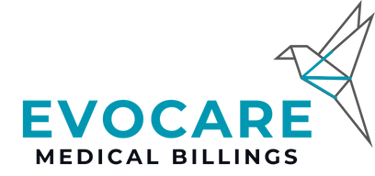

And Many More..!!
